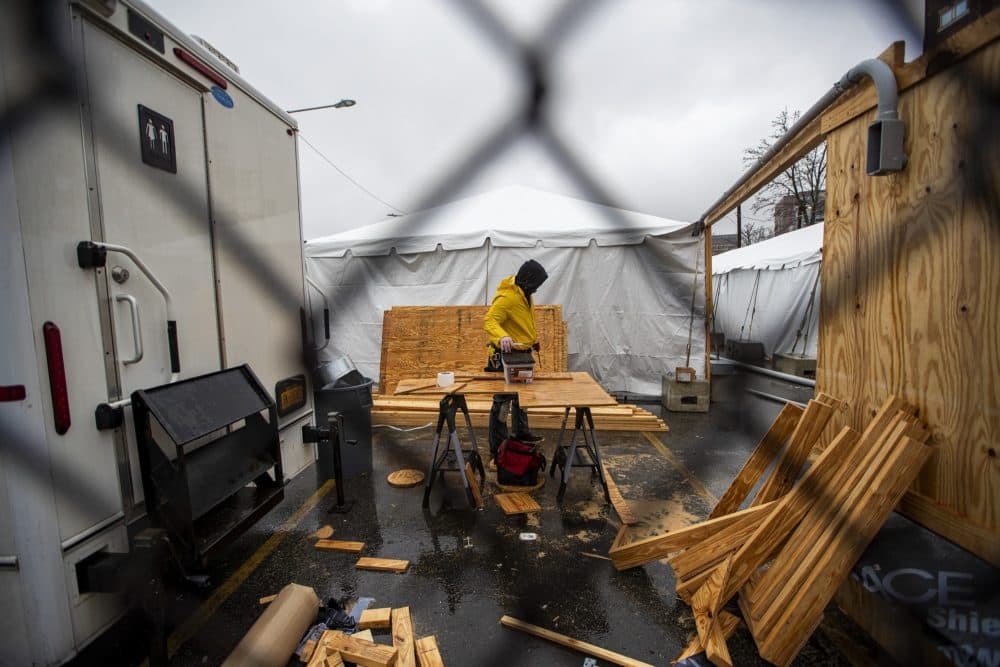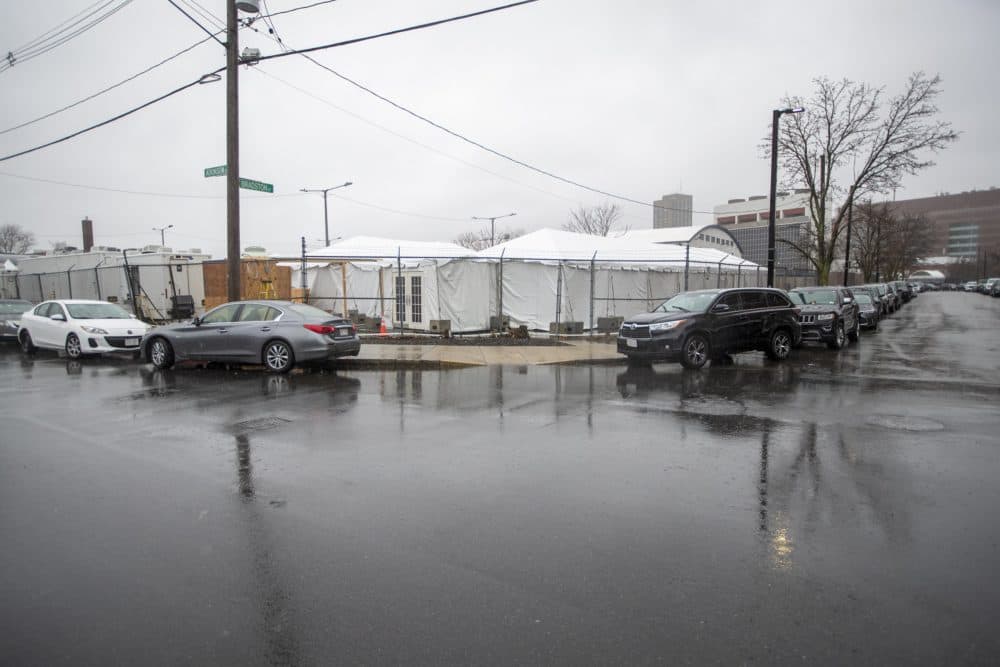Advertisement
'The Calm Before The Storm': Coronavirus Testing And Precautions For Mass. Homeless Population Ramp Up

Forty-seven-year-old Felix has been homeless on and off for a couple of years. He's staying at an emergency shelter in Worcester. And he's worried he could get COVID-19.
"I mean, four or five people could walk in there tonight with the coronavirus, and the staff won't be able to screen them or test them," he says. "... And then nobody would know until everyone in the population catches it."
Felix is his middle name. He doesn't want us to use his full name, because he's afraid he might not get a shelter bed after speaking publicly.
He's concerned not enough has been done to decrease the chance of the coronavirus spreading at the shelter.
But late Thursday, the city of Worcester released its plan to reduce the coronavirus risk in the homeless population. Over the next week, it's opening four satellite shelters, at two high schools and two churches.
Buses will transport people to the alternate sites. The plan is to make sure each shelter has no more than 25 people.
Joe Finn, president and executive director of the Massachusetts Housing and Shelter Alliance, wants to see this type of action around the state.
"I'm concerned right now that there's not enough coordination," he says, adding, "a sense of urgency on the part of the state to try to address this and to come up with an integrated plan about how we can put sites in place."
Finn says the Alliance has someone working with the Massachusetts Emergency Management Agency (MEMA) to help the state do that.
Advertisement
MEMA says it can't yet comment on state plans to add additional homeless shelter capacity.
In Boston, two tents have gone up outside the Boston Public Health Commission shelter on Southampton Street. One will have capacity to quarantine 20 people who have been exposed to the coronavirus but don't have symptoms. The other will be for up to 20 people who have symptoms and are awaiting test results.

"They have full beds, six feet between each bed. They're negative pressure; they're really quite extraordinary," says Dr. Jim O'Connell, president of Boston Health Care for the Homeless Program. The organization's doctors and nurses will staff the quarantine tents. On Tuesday, they started performing coronavirus tests in another tent behind their South End clinic and the Woods Mullen shelter. Before then, people had to get tested at hospitals.
Only 20 to 30 people in the city's homeless population have been tested so far, according to O'Connell. No one has come up positive, but some are awaiting results. Once people who are homeless do test positive — and if they don't have to be hospitalized — they will be cared for in a wing of Barbara McInnis House, the respite run by Boston Health Care for the Homeless.
"So it's kind of the calm before the storm, recognizing that without enough testing, we really don't know what the prevalence is in the population," O'Connell says. "And I worry that the homeless people are so below the visibility line ... that the real scariness of an outbreak among homeless people in any of our major cities hasn't been appreciated yet, and the alarm hasn't been sounded enough."
O'Connell applauds Boston Mayor Marty Walsh and Gov. Charlie Baker for sounding that alarm in recent weeks, but says everyone — the government and homeless service providers — probably should have acted sooner and faster.
Starting Friday, guests entering Boston's largest homeless shelter — Pine Street Inn — will be screened for symptoms of the coronavirus in a tent outside. On-site testing will start within days. Pine Street President and Executive Director Lyndia Downie says it's only the beginning.
"As you test more, you're going to need more quarantine sites," Downie explains. "I just want to keep urging people to keep working on it, keep finding sites, [and] to help us think about staffing all of that, because we're going to need it."
Meanwhile, advocates are working inside and outside shelters to help spread word about the coronavirus. Victory Programs is one organization doing street outreach in the Boston area. Mobile team director Richard Baker says the group is trying to stress hygiene among people who are homeless and those who inject drugs.
"But also recognizing that a lot of the folks we serve don't have the ability to wash their hands," Baker says. "So making sure that we can try to get access to hand sanitizers ... talking about safer ways that they can both protect themselves while using substances — not only just from the normal things that we're helping them prevent, but also how that can help prevent transmission of COVID-19."
In Lowell, the director of homelessness initiatives, Mary Shannon Thomas, says the city is installing portable toilets with hand-washing stations on the streets. And workers are handing out leaflets about the coronavirus. But they're not always sure the message gets through.
"It's challenging to emphasize to people how important this is," Thomas says. "You know, when daily life is a risk when we're not in a pandemic situation, I think it's really hard to say, 'OK, but this is even worse,' — like, 'this is even scarier' — when day-to-day challenges for a lot of the folks that we serve are just so profound."
Another challenge, Thomas says? Many people who are homeless live with chronic low-grade symptoms such as runny noses and coughs. So it's tough for them to differentiate between those and ones linked to the virus that's sparked a pandemic.
This segment aired on March 20, 2020.
